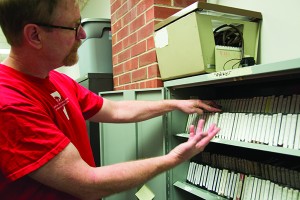Students using the new John X. Jamrich Hall may already know a lot about its new Starbucks and classroom design, but perhaps not so much about its namesake.

“I believe that [Jamrich] was probably the most important and significant president in the history of this college,” professor and chief archivist Marcus Robyns said.
The night before the new Jamrich Hall’s dedication, Robyns will present “Blood on the Table: The Battle for Shared Governance at NMU 1967-1976” at 7 p.m. Wednesday, Sept. 24 at Room 126 in the Learning Resources Center.
“The event is sure to be informative and entertaining,” senior library assistant Nora Scholl said, noting Robyns “spirited” presentation style.
Senior student assistant Allison Engblom works in the NMU Archives and said the audience can expect to learn about “a time when it showed how people were actually able to make a change by protesting and making their voices heard.”
Jamrich was president when the American Association of University Professors (AAUP) became the collective bargaining representative for NMU’s faculty.
One of the AAUP’s responsibilities is to negotiate the faculty’s employment contract with NMU’s administration. Before the faculty was represented by the the AAUP, there was no contract that guaranteed them shared governance of the university.
Robyns said the concept of shared governance is considered sacrosanct amongst university professors, comparing it to academic freedom in its importance.
Jamrich was NMU’s president from 1968 to 1983, and he inherited from president Edgar L. Harden a university that was in the midst of change.
“Tumultuous would be a way to call it, but it was also an exciting time, it was a challenging time,” Robyns said.
As detailed in the piece ‘The Battle for Shared Governance’, written by Robyns and Carrie Fries for the Michigan Historical Review, Harden’s decisions would deeply affect the climate at the university Jamrich was about to preside over.
The completion of the Mackinac Bridge and increases in undergraduate applications resulted in a boom in the student population, and the amount of students enrolled in undergraduate programs increased from 888 in 1956 to 7,085 in 1967.
The great increase in the student population necessitated expansion. The University Center, the Learning Resources Center, West Science and more residence halls were constructed under Harden’s watch.
It was also necessary to hire a new generation of professors to accommodate NMU’s expansion. Robyns explained the mindset of many of these professionals as they entered NMU under Harden’s tenure.
“[The new faculty] are coming from Ph.D. programs in the late ’60s during the time of social upheaval…and they come from schools that had much better… …shared governance amongst the faculty,” Robyns said. “And they come [to NMU] and it’s like ‘What? This is like an authoritarian place.’”
According to the Central Upper Peninsula and Northern Michigan University Archives, Harden fired professor Robert McClellan for his opposition to NMU’s proposed expansion into a largely working class neighborhood north of Wright Street.
Students and faculty objected. ‘McClellan Week’ followed, with student and faculty boycotts, marches and sit-ins.
In 1967, the faculty sued, challenging McClellan’s dismissal with support from the American Civil Liberties Union (ACLU) and the National Education Association (NEA). Harden would resign the same year.
“[Jamrich] came in here when literally the campus was practically on fire over the McClellan controversy,” Robyns said.
Jamrich settled the lawsuit and rehired McClellan, but the conflict of shared governance between the administration and the faculty would continue.
Faculty members voted to reject representation by the Michigan Education Association (MEA) in 1971 but would vote to join the AAUP in 1975.
According to Robyns and Fries’ piece, contract negotiations took months. Jamrich’s administration and the faculty came to an agreement in 1976, establishing the AAUP as the faculty’s collective bargaining representative.
Despite past conflicts, Jamrich is a popular figure on campus.
Senior speech, language, hearing sciences major Lauren Larsen gave several presentations about NMU’s history to incoming freshmen during the 2014 summer orientation.
“I think it’s crucial for Northern students to know about the history of Northern Michigan University,” Larsen said. “Especially to know about the passion that went into things such as the McClellan controversy and how students in the past have really worked to elicit change in their community. I think that’s something we can learn from [the presentation] and something that we can continue as Northern Wildcats.”
There is no cost to attend this NMU Archives presentation, and the public is welcome to attend.



























